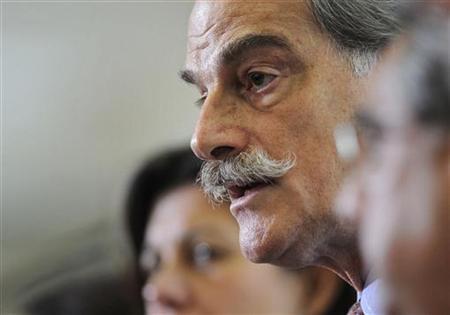Newsmakers
IMF: US slowdown likely temporary
(Agencies)
Updated: 2011-06-08 15:52
 |
Large Medium Small |
|
 John Lipsky, acting managing director of the International Monetary Fund (IMF), speaks during a news conference at the Treasury in London June 6, 2011.[Photo/Agencies] |
TOKYO - The Federal Reserve does not need to consider additional monetary policy stimulus as the world's largest economy is likely to pick up in coming quarters due to growth in exports and disposable incomes, IMF acting chief John Lipsky said on Wednesday.
A slowdown in growth in the United States and other major economies is likely to be temporary, caused by a spike in energy prices, the acting managing director of the International Monetary Fund told Reuters in an interview.
There is a risk of high unemployment as economic recovery will be slow, and it is appropriate for advanced economies to maintain accommodative monetary policies, Lipsky said.
"Our expectation is current US monetary policy is consistent with a return to moderate growth," he said, when asked if the Fed needed to embark on additional quantitative easing.
Lipsky would not be drawn into discussing any details of a proposed second euro zone bailout of debt-laden Greece.
Federal Reserve Chairman Ben Bernanke on Tuesday acknowledged the US economy had slowed but offered no hint of additional stimulus. If the current lull in the economy is more prolonged, that could put the Fed in a bind as it has exhausted many of its policy options.
The Fed has already slashed overnight interest rates to near zero and bought more than $2 trillion in government bonds, a policy known as quantitative easing, to pull the economy from a deep recession and spur a recovery.
The Fed's current $600 billion round of government bond buying, known as QE2, is due to end this month.
Almost all advanced economies also face the challenge of improving their public finances to reduce debt burdens, Lipsky said. Emerging market economies also need tighter fiscal and monetary policy to cope with inflationary pressure, he said.
Greece has gone through very strenuous efforts to cut spending and privatize assets to reduce its debt burden, Lipsky said.
Current plans to support Greece do not involve restructuring the country's debts, Lipsky said.
Lipsky was more cautious in his comments on the IMF's involvement in what euro zone sources say is a new 80-100 billion euro bailout package now taking shape and which effectively would replace a 110 billion euro deal agreed only a year ago.
He also dismissed as hypothetical the idea that private-sector lenders will voluntarily agree to roll over Greek debt.
"When you use the term new programme, right now we are talking about bringing the existing programme back into good focus," Lipsky said.
"There is a need for the programme to be adequately financed and that's being discussed right now. Any of this talk (on Greek debt rollovers) is completely hypothetical."
Lipsky, whose term as the Fund's No.2 official expires in August, is currently serving as acting managing director after Dominique Strauss-Kahn resigned on May 18 following his arrest in New York for attempted rape. Strauss-Kahn denies the allegations against him.
Lipsky refused to be drawn on whether the IMF should abandon its tradition of choosing a European to lead it, saying he was sure member countries would chose an appropriate candidate.
The IMF has a June 30 deadline to pick a successor to Strauss-Kahn, following a nomination period to June 10.
French Finance Minister Christine Lagarde and Mexican central bank governor Agustin Carstens have so far been nominated for the next IMF chief.
| 分享按钮 |